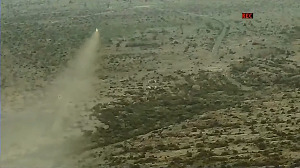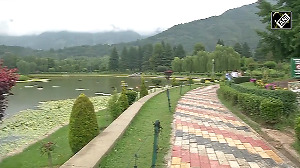To me, admiring Vivekananda also means being aggressive against those who have wronged us, especially those who are unrepentant like Pakistan, says Tarun Vijay.
While celebrating the 150th birth anniversary of the rebel monk Swami Vivekananda on January 12, 2013, shouldn't those who claim to be his followers and those who say they admire him, think what that 'cyclonic Hindoo monk' would have done to Pakistan if he were alive today?
He was the ochre-robed Sanyasi, a monk, who never delineated nation from Dharma. For him the nation was the embodiment of the living deity, Durga.
Like Sri Aurobindo, who conceptualised Mother India as Bhawani Bharati, Vivekananda stood for the rejuvenation of India and hence he represented the greatest heroes of our nation in Guru Gobind Singh and Shivaji.
With a razor-sharp intellect, he hit hard at those who derided India and her community. He challenged them, admonished them, used hard language against them, but kept the honour and dignity of India And Indians high.
He never yielded, never compromised on such issues. For him, it was a sin for a sanyasi seeking his own moksha, salvation, and remaining aloof from his environment. And so was for other civilians who took shelter under a discriminating ritualistic Dharma that was ruthless and inhuman to other humans on the basis of caste, creed or province.
He must be looked at now after what is happening today.
A martyr's body, a soldier of the Indian army, who was barbarically beheaded, is brought to his hometown and none from the political echelons attends his last rites. The mother of the martyred soldiers wails in vain.
None from the higher circles is there to console her, wipe her tears and say, 'O mother, your son sacrificed his life for the motherland, the entire nation shares your grief, please be proud of your brave son.'
Why do we live?
We live to find people who can be a part of our joys and sorrows. A mother who has lost her son needs consolation.
None was available.
Maybe because she was not a celebrity, or the political rulers felt that it wouldn't bring them votes or media projection.
Fie on them! They are better dead than to be controlling our destinies.
Even when a politician, however corrupt or wrong he might have been in his active life, dies because of a prolonged illness in his cozy bed at home, everyone rushes to pay tribute to him; lying through their teeth as they attribute the best virtues to his departed soul.
But we don't show even an iota of respect for our dead soldiers.
If Vivekananda were alive, would he have remained a silent spectator to this scenario saying he is a monk, and that his occupation is to do penance in the Himalayas?
The Kargil war saw such savagery. In an analysis, it is stated that 'Fidayeen attacks began after the Kargil war, which had its share of barbarity. Pakistani soldiers in the Kaksar sector captured a six-man patrol led by Captain Saurabh Kalia. Kalia and his men were tortured for 22 days, executed, and their mutilated bodies handed back to the Indian Army.'
Captain Kalia's father is fighting a lone battle for his dead son's honour in the international human rights body.
A report, published in the wake of the 'head-hunter' savages of the Islamic republic of Pakistan, says, 'In July 2011, the Indian Army hushed up the brutal killing of Havildar Jaipal Singh Adhikari and Lance Naik Devender Singh of the Rajput regiment in Kupwara district. Their bodies were sent to their families in Uttarakhand in sealed caskets as they were 'badly mutilated' and cremated as such. Their deaths were attributed to a firefight with militants along the border.'
What happened after that?
Absolutely nothing.
The news, the real story behind it, the wailings of the parents of these soldiers was all forgotten and the media too found new topics and moved ahead.
It's true that Pakistan has inherited the legacy of the barbarian savages, who talk sweetly at the table, but show their fangs once they are back in their homestead.
Backstabbing and lying, getting sold to the highest bidder in the dollar market, obeying serf-like to the powerful and becoming ruthless to the seemingly weak are their peculiar characteristics.
The Americans killed Osama bin Laden, threw more dollars and kept them satisfied. During Pervez Musharraf's time, the Washington Post published a caricature showing him as a dog licking the shoes of his master Uncle Sam. Musharraf showed some anger, but again boot polished his masters at Capitol Hill once he was given more dollars.
One can deal with such mafiosi governance, where, like Somalian pirates, none knows who the real decision maker is.
But here is a government which has even shamed the word 'pusillanimous'.
On a television channel when I asked if there was one person in India who would not demand revenge against Pakistan and Lashkar-e-Tayiba founder Mohammad Saeed's head, the honourable minister, representing the Government of India said, 'This is not the way a nation is run.'
I said, 'Please tell us Sir, how is it run? If you feel this demand is a bad one, why did India want Saeed to be extradited? To give him a rousing welcome or to send him to the gallows? And if I am too harsh, would you go for a mushaira in Islamabad to further effect a change of heart?'
India is still not considering the withdrawal of the Most Favourable Nation status to Pakistan; neither is the government thinking about an economic blockade against Pakistan; and South Block is still not considering unleashing an international campaign to expose Pakistan's inhuman savage legacy since 1947.
Living in the land of Guru Gobind Singh and Shivaji and behaving like cowards will not help.
To me, admiring Vivekananda also means to be aggressive on the wrong doer, especially against those who are unrepentant like Pakistan.
A nation that cannot express its anger and swear revenge when their sons return mutilated; even the gods will refuse to save such a spineless Republic.
Tarun Vijay is a member of the Rajya Sabha; member, Parliamentary Standing Committee on External Affairs, national spokesperson for the Bharatiya Janata Party, and honorary director, Dr Syama Prasad Mookerjee Research Foundation, New Delhi.









